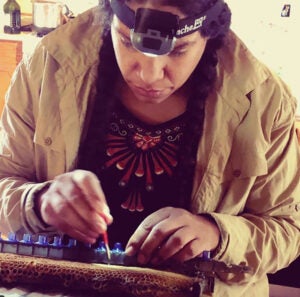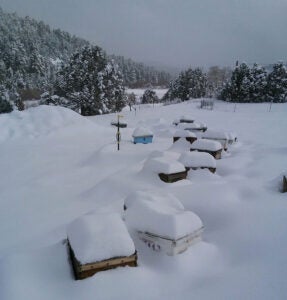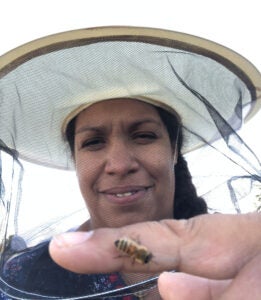When you walk through the produce section at the grocery store, how often do you think about the contribution that bees made to the many fruits and vegetables you see?
For Melanie Kirby of Zia Queenbees Co., based in New Mexico, that’s something that she thinks about often. Her company focuses on breeding queen bees to provide beestock for beekeepers. As a landless beekeeper, Kirby also offers pollination services in exchange for land use.
Bees are an essential component of agriculture and facilitate the pollination of $15 billion dollars worth of crops in the U.S. every year. Without bees, many crops would suffer significantly from a loss in yields.
Additionally, not all bees are the same. There are over 3,600 species of bees that exist in the United States, with different preferences in environment, food, and behavior.

Keenly aware of this, Kirby hopes to preserve the genetic diversity of bees through a Brighter Future Fund grant that she won this year.
The Brighter Future Fund (BFF) provides direct support to farmers and ranchers across the country, allowing them to grow their business and build a sustainable farming operation. The fund supports greater equity and opportunities for producers from socially disadvantaged or limited-resource communities.
Kirby applied for the grant in the hopes of raising funds for a “bee hut,” where she can expand upon her breeding efforts.
Kirby is a registered member of Tortugas Pueblo, a state-recognized tribal community in southern New Mexico. Identifying as Indo-Hispano and of Caribbean descent, Kirby followed an unconventional pathway to becoming a beekeeper and queen bee breeder.
When Kirby joined the Peace Corps in the early 2000s, she was assigned to be a beekeeper in Paraguay. With no prior experience, Kirby was trained on assignment for everything that would be required from her, and she discovered a buzz for bees that she never realized before.
After finishing her contract with the Peace Corps, Kirby moved to Hawaii to work on a friend’s flower farm managing pollination operations. It was there that she was exposed to queen bees and eventually began working at Kona Queen, a queen bee supply farm.
Kirby spent nearly a decade working on various farms across the country, honing her expertise and building her knowledge base on how to care for and rear queen bees. She quickly realized when she moved back to her native New Mexico that most of her experiences were gained in tropical or subtropical environments.
The semiarid environment of New Mexico, coupled with low humidity, translated to a very different landscape on which to cultivate bees, and Kirby realized that specific bee ecotypes, or breeds, uniquely adapted to New Mexico’s climate, were essential to maintain genetic diversity as well as ensure continued agriculture in New Mexico.
Kirby established The Rocky Mountain Bee Survivor Queenbee Cooperative, a grant-funded project by SARE, a nonprofit focused on education and implementation of sustainable agriculture. The cooperative says it aims to facilitate “queen honeybee breeding and rearing exchange[s], focusing on high altitude alpine survivor stock establishment and promotion.”
She also established Adaptive Bee Breeders Alliance, otherwise known as ABBA, to develop a network that spans across more than seven states and can “nurture future generations of beekeepers, especially breeding efforts, because it’s very niche within the sector,” she said.

Kirby knew that to fortify New Mexico’s agriculture, studying queen bees uniquely adapted to the high altitudes of the state and breeding them would be needed. When she saw the callout for AFT’s Brighter Future Fund, she decided to pitch the idea of a “bee hut,” where she could not only breed bees but also collect and store wildflower seeds native to her state.
When the Calf Canyon/Hermit’s Peak fire in 2022 ravaged over 500 square miles in New Mexico, Kirby and other community members assembled supplies for folks to regenerate fire impacted land. Providing wildflower seeds paired with pollinator guides, Kirby hopes that she can help her community heal their land.
Kirby is working with other indigenous matriarchs under a project called Poeh Povi: The Flower Path, to best support pollinator stewardship and rebuild the fire-damaged lands in the state.
She is using her prior experience in bee breeding to ensure resilient bee stock while actively nurturing pollinator habitats through wildfire restoration.
“I’ve always wanted my own little bee hut lab to do the work I want to do,” said Kirby. “I feel really honored to be selected” as a grant recipient.
The possibilities are endless with a designated space for bee insemination, said Kirby. “I can inseminate queen bees with desirable genetics, or even do targeted insemination for people who want specific bee genetics. I would also have a place to collect seeds and store them.”
Kirby hopes that her “bee hut” will act as a mobile lab of sorts, where different beekeepers across the state can have shared access.

With the funds provided through the BFF grant, Kirby is one step closer to building her bee hut and expanding the scope of her work.
“The work that I want to do now is to bring it back to Native American values,” said Kirby. “I am in the pursuit of scientific inquiry and I want to add culture and art to it. … This funding will help show this connection of soil, to bees, to plants, which requires our stewardship. Ultimately, we are all connected.”
Kirby honors her culture and history by providing farmers with bees so they can farm in a way that strengthens communities, promotes nutritious diets. She contributes to a future where farming can be robust, successful, and honored in our society.
By supporting her vision for agriculture through the Brighter Future Fund, American Farmland Trust is standing by their commitment to farmers and fulfilling its mission of keeping farmers on the land and protecting farmland.
This article was published on AGDAILY on behalf of American Farmland Trust.
American Farmland Trust’s Brighter Future Fund provides grants to help farmers nationwide improve farm viability, access, transfer or permanently protect farmland, or adopt regenerative agricultural practices. In 2022, the fund began prioritizing funding for farmers who identify as BIPOC, Veterans, LGBTQIA+ and beginning farmers who had limited access to financial resources in the past. Since 2020, AFT, with the support of Tillamook, Tractor Supply, and others, has provided approximately $4.5 million in grants directly to more than 2,000 farmers nationwide. Learn more and contribute here.






